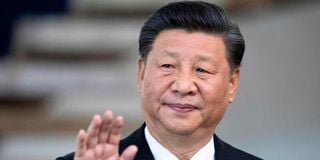Great milestones as Chinese ruling party marks 100 years

China's President Xi Jinping waves at the press before the 11th BRICS Summit at the Itamaraty palace on November 14, 2019 in Brasilia, Brazil.
On Thursday July 1, 2021 President Xi Jinping will lead China in marking 100 years since the formation of the Communist Party of China.
The celebrations that have been closely followed around the world underlie the incredible societal transformations that China has registered under the leadership of the CPC.
Rising from an inward-looking polity, the party oversaw the founding of a new republic in 1949 and subsequently implemented a series of targeted policies that have created inordinate social, political, diplomatic, and military visibility and utility for China.
While China’s rise has been viewed with much skepticism and even fear from some Western countries, as the largest developing country, Beijing has provided a new impetus for other emerging economies on what is possible when the government and people unite to confront enduring challenges.
Under the leadership of the CPC, China is actively extending proceeds of its development to other countries in the spirit of shared prosperity.
Economic partnership
In Africa, where China has been the largest trade partner for over a decade now, Chinese money, technology, and to a less extent labour, are transforming the continent’s infrastructure capability under the Belt and Road Initiative (BRI).
Kenya, which is home to over 400 Chinese enterprises, has so far implemented a number of development projects such as the standard gauge railway line connecting the port city of Mombasa and the administrative capital, Nairobi; the Lamu deep sea port, Nairobi Expressway and Garissa solar plant, as a result of its economic partnership with China.
As the world watches the CPC centenary celebrations with admiration, there are a number of insights that other countries can learn from China’s governance model. CPC is arguably one of the oldest parties in the world, with the largest following and highest citizens’ approval. According to a poll published by the Washington Post in May 2021, Chinese citizens’ trust in their national government hit 98 percent.
While CPC commands the super majority of followers among the nine political parties in China, it has governed in consultation with and contributions from other political parties. China’s multiparty cooperation has ensured that all political actors have adequate space to share their views on the country’s governance agenda.
This is an important lesson for multiparty democracies in which synergy takes precedence over party hue. Eventually, unity and stability of a country is cultivated and fostered.
CPC’s political philosophy is deeply rooted in Chinese traditional thought. China’s culture and longstanding history spanning over five thousands has given the country a profound reservoir of ideas, past challenges as well as triumphs; all of which have gone into shaping the outlook, resilience, innovation and service delivery to the people. Only by tapping into collective ideologues that people can relate with can parties and governments win the heart and minds of the masses.
Thirdly, the CPC has managed to get the largest following by embodying the interest of the widest social groups, while promoting the shared goals of individuals as well as corporates through participatory decision making.
Tribalism
In many jurisdictions, political parties portray narrow representation in which only a segment of society such as elites have sway. Other vices such as tribalism have also held back the ability of ruling parties to promote national unity and service delivery in a number of African countries.
Finally, the CPC has built a strong state competence that has enabled the party to deliver wide-ranging public goods such as infrastructure, security, industrial expansion, healthcare, and education. China has for instance eliminated extreme poverty and just this week, the WHO declared the country malaria free.
The comprehensive containment measures that has seen China reduce the impacts of Covid-19 pandemic on lives and livelihoods better than other countries is further testimony to the veracity of CPC governance model.
These pointers affirms the legacy of the CPC and offer crucial leaning points for other societies keen on upstaging development challenges in the scale that China has done. Luckily, for Africa, the Forum on China Africa Cooperation, founded in 2000, provides a platform for consultation and exchange with China for mutual development and progress.
The milestones already consolidated by the CPC provide a perfect backdrop to confront present and future challenges. As a major country, the world looks forward to an even more constructive role for China in global affairs. Congratulations to the CPC and the people of China on the centenary of dedicated service and leadership.
The writer is a scholar of international relations with a focus on China-Africa cooperation.





